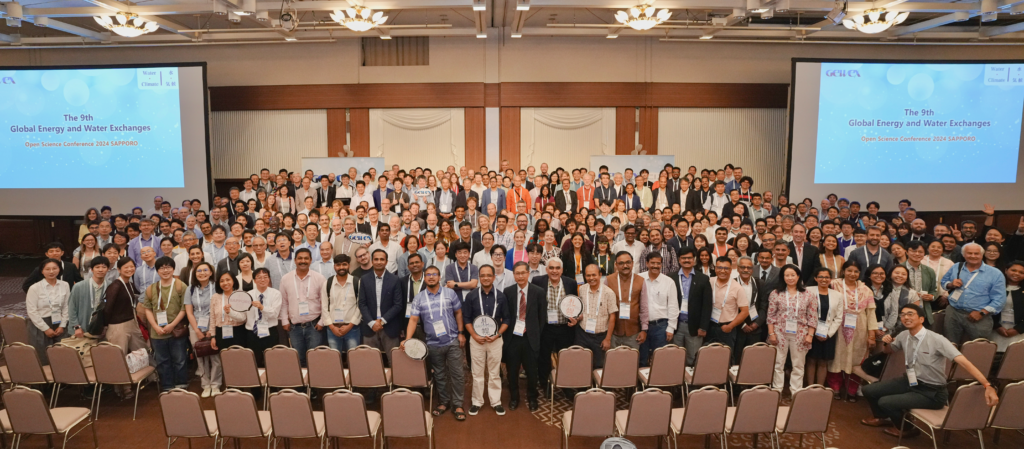GEWEX meeting in Japan
The Department of Energy (DOE) scientists have a longstanding tradition of leadership and engagement in the World Climate Research Programme (WCRP)’s pivotal project, the Global Energy and Water Exchanges (GEWEX). GEWEX focuses on observing, understanding, and modeling the global energy and water cycles. To commemorate over 30 years of GEWEX research, the 9th Global Energy and Water Exchanges Open Science Conference was held from Jul 7-12, 2024 in Sapporo, Japan. This conference aimed to set the stage for the next phase of research addressing the grand challenges on water and climate.
The conference revolved around three primary themes:
- Water and Climate
- Extremes and Risks
- Water, Energy and Carbon processes.
It brought together more than 700 observationalists and modelers from around the world to review progress, coordinate initiatives, and strategize future directions in these research areas. Notably, this marked the first time that a GEWEX scientific conference was held jointly with stakeholders, fostering invaluable exchanges and helping to establish a common set of questions and challenges.
Several DOE Earth and Environmental Systems Modeling (EESM) scientists participated in the conference. E3SM chief scientist Ruby Leung, a GEWEX science steering group member, was on the conference program committee and led a session discussion on “Organization of convection”. E3SM Atmosphere Group leader Shaocheng Xie, who serves on the GEWEX Atmospheric System Studies (GASS) panel, facilitated a breakout session focusing on topics related to precipitation and global precipitation experiments at the conference. Other EESM attendees included Yuying Zhang, Yun Qian, Samson Hagos, and Sean Santos. At the conference, DOE-funded research was presented on several key topics, including the diurnal cycle of precipitation, cloud evaluation, subgrid parameterization of convection, tropical cyclones, subseasonal-to-interannual predictability, lake-effect snow extreme event, and the numerical stability of atmosphere-surface coupling methods.
Several ongoing research activities and future initiatives discussed at the conference are particularly relevant to E3SM:
- A proposal for Intercomparison Experiments of Global Storm-Resolving Models (GSRM) in climate-scale simulations – This project follows the previous GSRM intercomparison experiment under the DYAMOND (the DYnamics of the Atmospheric general circulation Modeled On Non-hydrostatic Domains) project, but extends the simulation to one year from March 1, 2020 to February 28, 2021. This allows to cover the four seasons (March-April-May (MAM), June-July-August (JJA), September-October-November (SON), and December-January-February (DJF). E3SM scientist Chris Terai is part of the proposal team and SCREAM will participate in the intercomparison.
- The ORCESTRA campaign – the Organized Convection and EarthCare Studies over the Tropical Atlantic (ORCESTRA). This international observational initiative, which combines eight different sub-campaigns, has recently concluded in the tropical Atlantic region. It sampled the inner life of the Inter-Tropical Convergence Zone (ITCZ) with various observational platforms (ground-base, research ships, aircrafts, and satellites) to better understand the physical mechanisms that organize tropical convection at the mesoscale. ORCESTRA will provide an observational benchmark for developing a new generation of global storm-resolving climate models (such as E3SMv4 and beyond).
- Global Precipitation Experiment (GPEX) – A new World Climate Research Programme (WCRP)’s Lighthouse Activity. GPEX will include coordinated global field campaigns focusing on different storm types (atmospheric rivers, mesoscale convective systems, tropical cyclones, among others) across various regions and seasons. It will provide a unique opportunity to foster progress in filling gaps in observing and understanding processes critical to precipitation and to accelerate progress in improving precipitation prediction and its applications for resilient and sustainable development. E3SM chief scientist Ruby Leung serves on the GPEX Interim Steering Science Group.
See the full list of presentations on the GEWEX 2024 Open Conference website.
This article is a part of the E3SM “Floating Points” Newsletter, to read the full Newsletter check:



